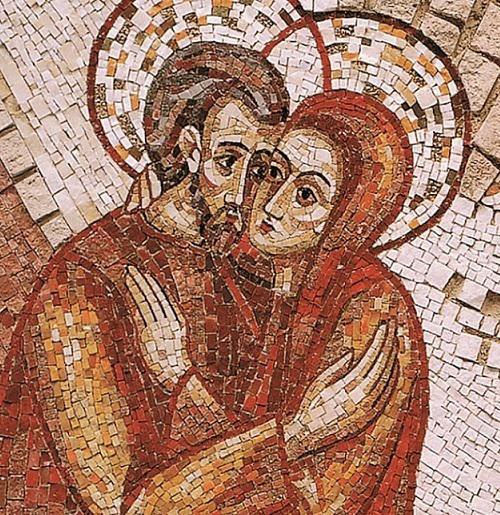In his play The Jeweler’s Shop, Karol Wojtyła writes movingly, and with great perception, about the heights and the depths of love and marriage. The story follows three couples as they discover, and sometimes resist, the requirements of love within marriage. In each case, the spouses must navigate the dynamics of their families of origin as they struggle to reconcile their individual sense of identity with the demands of loving another. In Act One, Teresa reflects on what makes love exciting, and marriage such a challenge. Sexual attraction is mixed with fear of the unknown. Even before she and Andrew make their vows, Teresa knows that their dreams of how married life should unfold, and the reality of two becoming one, do not necessarily correspond: “I was thinking about signals that could not connect. It was a thought about Andrew and myself. And I felt how difficult it is to live.”
We need not be married ourselves to understand that marriage is hard. We all come from families with some level of dysfunction. We observe marriages in our extended families, among our friends and associates and, from afar, the endless coupling and un-coupling of celebrities. Just as Teresa and Andrew struggle to send and receive the individual “signals” that express both their love and their expectations of each other, married couples experience the challenges of “connecting” in a multitude of ways. This is part of what makes marriage so wonder-full, and even frightening. It’s also what binds the couple more closely together, allows for constant discovery of the mystery of the other, and makes the “Yes” of the vows—a “Yes” that takes a risk in promising what it cannot fully know, for a future that is always ahead of them—an opportunity to enter into the adventure together.
The daily work of “connecting signals” takes on an added challenge for the couple experiencing infertility. In a world that simultaneously prizes an autonomy that embraces a “child-free by choice” lifestyle and indulges celebrations of baby bumps and clever “gender reveals,” it is the childless couple, longing to conceive, that often experiences “how difficult it is to live.” Such couples may find themselves frustrated and confused by the signals coming from family, friends and media about starting a family, while trying to remain tuned in to each other’s feelings, fears and desires. Faithful couples may perceive mixed signals coming from a God who commands them to “be fruitful and multiply,” promises fidelity and has proven to be the womb-opening miracle worker, from Sarah and Rachel to Anna and Elizabeth. They can feel mysteriously impeded in their ability to carry out the mission of parenthood, perplexed by which criteria they have yet to meet to qualify for their own miracle of Biblical proportions.
The signals received from the culture, and even from within our families, are equally mixed: don’t rush into marriage/don’t wait too long; don’t have a honeymoon baby!/when are you starting a family? The expectations placed on couples are often unrealistic, confining them to a view of marriage constructed by the perceptions of parents, in-laws, friends, and strangers. Daughters or sons dealing with infertility are asked (sometimes repeatedly) by parents when they will start “giving us grandchildren.” Many experience perfect strangers asking about their parental status, and are met with intrusive follow-up questions: “What are you waiting for?” “Does one of you have a problem?” Finally, the childless spouses have their own signals to deal with, each one trying to keep open with listening hearts. Even as they focus on each other, communication with each other can become strained, and it can be equally difficult to approach God with openness and trust.
While all marriages are called to model the love between Christ and His Church, which inevitably requires every couple to take up its cross, the couple struggling with infertility suffers a particular cross, one that can distort the very perception of their marital union. Infertility is indeed a “cross,” a lifelong burden for many, and a source of great pain and suffering. Yet salvation history is the story of God’s faithful accompaniment of His people through pain and suffering, and the transformation that is possible when we surrender to God’s providence and tender care (“Behold, I make all things new” [Rev 21:5]). For the infertile spouses, their union is far from incomplete: while unable to bear children, they remain witnesses to the fullness of a sacramental marriage that is always a participation in the fruitfulness of the Trinity. This, however, requires a shift in thinking whereby the concept of fruitfulness is not limited to the act of procreation. In Timothy O’Malley’s excellent article, “Editorial Musings: The Charism of Infertility,” O’Malley suggests that,
It is precisely the charism of the infertile couple in the Church to remind us that the fundamental end of marriage is not reproduction at all costs. Rather, it is the giving over of the entire life of the couple to God.… [Through their struggle,] the couple is to love unto the end, to transform even this diminishment into an occasion of Eucharistic love. For in Christ’s Cross and Resurrection, every dimension of human life can become a new occasion for fruitfulness.
This is an important point, both for infertile spouses and for pastors and others who might accompany them on this path: infertility is not a “journey of hopelessness,” but a pilgrimage of Faith (in God, who provides, and does not abandon); Hope (growth in the knowledge that God is leading them, rather than “wishfulness” that the situation might change); and Love (the self-emptying presence to each other that brings new life in unexpected ways). With the help of spiritual and emotional accompaniment, the couple can learn to acknowledge and be with the suffering (never denying it or forcing themselves to “get over it”) and discern what God is calling them to, a fruitfulness that only they can fulfill. If the infertile couple can finally embrace the vocational aspect of their infertility, they can cultivate a strong marriage, a strong relationship with God, and become effective witnesses to other married couples, priests and religious, and to a world that is starved for true Love. The question for them—and for the Church—is: How best can this be done?
Answering this question cannot possibly be accomplished in one brief article, nor can we offer a solution to the mysteries surrounding infertility. What we propose here is the start of a conversation that accounts for the complexity of the emotional and spiritual difficulties surrounding infertility. While the infertile couple desperately searches for a solution to their infertility, what they need most from the Church is to be heard and understood and, most of all, to be accompanied on their path in order to discover a way of fruitfulness in what they may have come to view as the barren landscape of their marriage. While the Church has spoken on theological and ethical aspects of the issue, there is a need at this moment in history to consider more fully the practical and spiritual challenges of the experience of infertility. Because of the sheer scale of infertility, let alone the pervasiveness and destructiveness of the ‘fixes’ offered for it, there is a sense of pastoral urgency. By listening to the experience of infertile spouses, the Church can better learn to minister to these couples, to acknowledge the difficulty of their plight, and to help them move forward with hope. This is a moment for the Church to reach deeply into its own tradition and articulate more clearly to infertile couples the fruitfulness that every married couple already shares in, whether they have children or not.
While every couple experiences trials in marriage, infertility strikes at the heart of its identity, as “one flesh” created to “be fruitful and multiply.” What is the meaning of this desire to conceive and bear children, when this very desire is continually thwarted? It is commonly reported that one in eight couples experience difficulty conceiving: whether it is the total inability to conceive, or to bring a baby to term. The reasons are many, and range from genetic factors, disease and accidents rendering either spouse sterile; to environmental (pollution, water systems and food sources contaminated by medical waste, synthetic hormones, and pesticides); to the simply mysterious “no diagnosis.” This last is, in some respects, most trying for a couple’s faith, because there is no cause to pinpoint, no person or circumstance to “blame.” None—except for God.
Whatever the cause, the inability to conceive begins as an unexpected but more or less manageable obstacle. As time passes and new interventions are tried and fail, what seemed like a temporary setback gives way to frustration, anger, envy and desperation. Every month brings a physical reminder that no baby is coming. Friends and family members begin sending out their own birth announcements, and the pressure to “catch up”—along with the continuing intrusive questions—puts a strain on all of the couple’s relationships. Every exhortation to “just relax,” or “have fun trying” may be well-meaning, but exerts more pressure on the couple to “perform and produce.” Such words deliver a blow to the couple’s already fragile sense of masculinity and femininity and intensifies the crisis of faith their infertility engenders. In the search for answers, and for blame, they are tempted to point fingers at each other, to look inward with self-hatred, and heavenward in desperation.
Because the Church prohibits the use of Artificial Reproductive Technologies, it can seem that a couple is left to figure out how to deal with their situation on their own. So often it appears that the Church is giving them a “no” without providing any acceptable alternative. And there is a real danger of merely offering technical solutions to the problem of infertility—even morally licit ones. Obviously it is important for spouses to optimize their health so they might achieve pregnancy, but when the technical approach begins to endanger the well-being of a couple, it no longer becomes life-giving. A shift from achieving health to achieving a baby at all costs threatens not only the physical, mental, and spiritual health of the spouses, but also the health of the marriage. Besides the obvious physical risk of injecting hormones and surgery, there is the mental strain brought on by the constant monitoring of signs of fertility and timing sexual relations to coincide with the woman’s peak fertility. Stress can be a major contributing factor to infertility, and trying to relax and be a generous, self-giving lover while optimizing fertile times becomes increasingly difficult. The question of how far a couple is willing to go with medical interventions must be faced, since there will always be couples for whom technical solutions don’t result in having a baby. Beyond all this, there are the not-so-obvious risks of considering a child as a product or personal project. When a couple tries months or years to conceive, it becomes difficult to remember that a child is a gift. If they are not careful, the spouses’ endless attempts to interpret possible pregnancy signs, as well as the continual focus on hormonal evaluations and interventions, can have the effect of esteeming the act of achieving pregnancy as a mission in and of itself.
While some may argue that those experiencing infertility are too sensitive, the language used to discuss infertility is important. Being compassionate toward the infertile couple, while helping them to integrate their physical, emotional and spiritual woundedness into a creative surrender to God, is a difficult balancing act. It embraces the unique and mysterious fruitfulness only they—in cooperation with God—can bring to fullness. Infertile couples must guard against internalizing unintentionally hurtful words of “advice” and intrusive questions, which may fuel their pain, rather than bring them through it. Well-meaning friends, can say things such as, “I can’t even imagine how difficult it must be to not be able to conceive a child. You must be so strong. My children are my whole life!” Rather than feeling affirmed and understood, this can leave those struggling with infertility discouraged, isolated, and resentful. Should infertile couples just move on with life (and stop being “snowflakes”)? Or should everyone in their sphere (family, friends, social media) tip-toe around them? The answer lies somewhere in the middle: increased knowledge of the challenges of infertility and compassionate pastoral accompaniment.
The descriptive “infertile” itself is a point of contention when considering how to talk about the state of childlessness. Some—especially women—may recoil at being referred to in this way, since it marks them out as something other than whole, worthwhile persons. Irrational as such thoughts might be, they are reinforced by some Catholics who assume childlessness to be a voluntary “no,” resulting from of a lack of faith, or a failure to make exhaustive use of morally licit technical solutions to the problem. Women feel this most acutely, since it is their bodies that bear the brunt of side-effects from medications, hormone treatments and (sometimes repeated) surgeries. They feel the physical and emotional side-effects of treatments in their very being. This is not to mention the distinctive toll infertility takes on men, too often overlooked or underplayed.
Whether infertility is a temporary burden or a permanent state, the infertile couple’s marriage takes the shape of the cross, with its dual meaning of suffering and salvation. Christ’s Cross gives our suffering its paradoxical nature, proving that abundance and light can emerge from the depths of barren darkness. So it is with spouses who evidently carry their infertility as a cross, but which need not mean a burden that forever weighs down their relationship, or breaks (cf. Mt 11:30). The language of the cross is appropriate but often misunderstood as a pain from which there is no relief: wrenching, humiliating, inescapable death. The infertile spouses must seek the dual meaning of their particular suffering, and find in it God’s fidelity to them, and the fruit that He desires to bring out of it. On Golgotha, Christ was stripped of everything, and poured Himself out completely. Similarly, the infertile couple feels stripped of their hopes for a family, and emptied physically, given the toll that medical interventions take on the body. Yet Christ, by handing Himself over to the will of God, brought forth the fruit of Salvation, the defeat of Death. His embrace of desolation and loss transformed suffering into a way of unleashing Love. Likewise, if the spouses can hand themselves over to Christ, will allow their wounds to be absorbed by His, new life will emerge from their union.
Though the cross of infertility diminishes with time, the scar it leaves remains tender. And yet this can be transformed by Christ’s Cross into a path of Love and Life unique to the couple, bringing forth fruits that could only have come from their union and this particular suffering. St. Josemaria Escriva states: “God in his providence has two ways of blessing marriages: one by giving them children; and the other, sometimes, because he loves them so much, by not giving them children. I don’t know which is the better blessing.” This may be shocking to those who cannot imagine an inability to conceive as a blessing. Yet Escriva continues, “Often God does not give children, because He is asking them for something more.” God does not abandon couples struggling with infertility. Even without a biological child, a husband and wife can find abundant fruitfulness in their marriage by remaining close to the Lord and allowing Him to guide them.
As a couple attempts to carry the cross of infertility, it is essential that others come alongside to help shoulder the burden. The Church can help a couple sort through the myriad of options, clarifying the moral alternatives available; but the fundamental task of the Church is to accompany the couple. Above all, the infertile couple needs spiritual guidance and support through the journey. It is easy for spouses to feel forgotten and isolated and to question why a good God would not bless them with children. Pastors, parishioners, people in ministry, family and friends must learn to walk in a better way with the infertile couple; and infertile spouses must become docile to the promptings of the Holy Spirit in embracing a parenthood unique to them.
Priests are in a unique position to affirm the goodness of the struggling couple’s marriage, encouraging them in knowing the presence of God. They must, of course, be aware of the impact infertility has on a marriage in the first place. One simple way that a priest might support those in his parish struggling with infertility is by offering a Mass specifically for infertile couples, that they might receive physical/spiritual/emotional healing and discern where God is calling them to be fruitful. This would allow couples to see that the Church is attuned to their situation and help them connect with other couples with similar struggles. Another way that a priest can be sensitive to this struggle is on “trigger days” like Mother’s Day and Father’s Day. These can be tortuous to those who long to be parents. He might give the blessings for mothers and fathers at the end of Mass when the entire congregation is already standing so as not to draw attention to those remaining seated, grieving anew—and publicly—that they have no children.
In the third act of Wojtyła’s play, Christopher and his bride-to-be wrestle with the same excitement and uncertainty that his parents—Andrew and Teresa—faced when contemplating the unknowns in their married future. They’ve already experienced through their respective parents’ marriages that every relationship is susceptible to circumstances that make it “difficult to live.” Their future—like that of every couple who enters marriage with hope and expectation—is a mystery to be unfolded anew. The mystery of childlessness is unexpected, unplanned and unwanted; yet, it need not be without hope or fruitfulness. The journey into this mystery must be done together, but also accompanied by family, friends and the Church. The spiritual support offered by the Church not only gives meaning and purpose to the couple’s suffering but leads them to discover the mission of every marriage to go together where God leads.
Spiritually uplifting and supporting infertile couples is a task in which the Church, as an expert in humanity (cf. Pope Benedict), must be engaged. The Church is in a unique position to mother infertile couples: not merely seeking for them technical solutions, but listening to them, learning from them, and discovering together the shape authentic and fruitful accompaniment must take.
Kimberly Henkel, Ph.D. and Ann Koshute, M.T.S., are the founders of Springs in the Desert, a Catholic ministry devoted to helping women and couples struggling with infertility to process and move beyond their grief to find the fruitfulness God has planned for their marriage. They are currently writing a book, Springs in the Desert, which will lend itself to individual as well as group study.
Keep reading! Click here to read our next article, When Sex Becomes Cheap.



